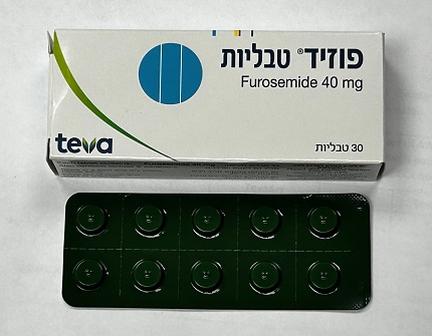Quest for the right Drug

פוזיד טבליות FUSID TABLETS (FUROSEMIDE)
תרופה במרשם
תרופה בסל
נרקוטיקה
ציטוטוקסיקה
צורת מתן:
פומי : PER OS
צורת מינון:
טבליה : TABLETS
עלון לרופא
מינוניםPosology התוויות
Indications תופעות לוואי
Adverse reactions התוויות נגד
Contraindications אינטראקציות
Interactions מינון יתר
Overdose הריון/הנקה
Pregnancy & Lactation אוכלוסיות מיוחדות
Special populations תכונות פרמקולוגיות
Pharmacological properties מידע רוקחי
Pharmaceutical particulars אזהרת שימוש
Special Warning עלון לרופא
Physicians Leaflet
Special Warning : אזהרת שימוש
4.4. Special warnings and precautions for use Conditions requiring correction before furosemide is started (see also section 4.3) • Hypotension. • Hypovolaemia. • Severe electrolyte disturbances – particularly hypokalaemia, hyponatraemia and acid-base disturbances. Symptomatic hypotension leading to dizziness, fainting or loss of consciousness can occur in patients treated with furosemide, particularly in the elderly, patients on other medications which can cause hypotension and patients with other medical conditions that are risks for hypotension. Particular caution and/or dose reduction required • elderly patients • difficulty with micturition/potential obstruction in the urinary tract including prostatic hypertrophy (increased risk of acute retention) • diabetes mellitus (latent diabetes may become overt: insulin requirements in established diabetes may increase: stop furosemide before a glucose tolerance test) • gout (furosemide may raise uric acid levels/precipitate gout) • patients with hepatorenal syndrome • impaired hepatic function (see section 4.3 and below – monitoring required) • impaired renal function (see section 4.3 and below – monitoring required) • hypoproteinaemia e.g. nephrotic syndrome (effect of furosemide may be impaired and its risk of ototoxicity potentiated – cautious dose titration required) • in moderate liver congestion dosage adjustment may be needed • patients who are at risk of pronounced fall in blood pressure. Avoidance with other medicines (see also section 4.5 for other interactions) • concurrent NSAIDs should be avoided – if not possible diuretic effect of furosemide may be attenuated • ACE-inhibitors & Angiotensin II receptor antagonists – severe hypotension may occur – dose of furosemide should be reduced/stopped (3 days) before starting or increasing the dose of these. Laboratory monitoring requirements • Serum sodium Particularly in the elderly or in patients liable to electrolyte deficiency. • Serum potassium The possibility of hypokalaemia should be taken into account, in particular in patients with cirrhosis of the liver, those receiving concomitant treatment with corticosteroids, those with an unbalanced diet and those who abuse laxatives. Regular monitoring of the potassium, and if necessary treatment with a potassium supplement, is recommended in all cases, but is essential at higher doses and in patients with impaired renal function. It is especially important in the event of concomitant treatment with digoxin, as potassium deficiency can trigger or exacerbate the symptoms of digitalis intoxication (see section 4.5). A potassium-rich diet is recommended during long-term use. Frequent checks of the serum potassium are necessary in patients with impaired renal function and creatinine clearance below 60ml/min per 1.73m2 body surface area as well as in cases where furosemide is taken in combination with certain other drugs which may lead to an increase in potassium levels (see section 4.5 & refer to section 4.8 for details of electrolyte and metabolic abnormalities). • Renal function Frequent BUN in first few months of treatment, periodically thereafter. Long- term/high-dose BUN should regularly be measured. Marked diuresis can cause reversible impairment of kidney function in patients with renal dysfunction. Adequate fluid intake is necessary in such patients. Serum creatinine and urea levels tend to rise during treatment • Glucose Adverse effect on carbohydrate metabolism - exacerbation of existing carbohydrate intolerance or diabetes mellitus. Regular monitoring of blood glucose levels is desirable. • Other electrolytes Patients with hepatic failure/alcoholic cirrhosis are particularly at risk of hypomagnesia (as well as hypokalaemia). During long-term therapy (especially at high doses) magnesium, calcium, chloride, bicarbonate and uric acid should be regularly measured. Clinical monitoring requirements (see also section 4.8) Regular monitoring for • blood dyscrasias. If these occur, stop furosemide immediately • liver damage • idiosyncratic reactions. In premature infants there is a risk of development of nephrocalcinosis/nephrolithiasis. Renal function must be monitored and renal ultrasonography performed. Other alterations in lab values • Serum cholesterol and triglycerides may rise but usually return to normal within 6 months of starting furosemide. Excipients Patients with rare hereditary problems of galactose intolerance, the total lactase deficiency or glucose-galactose malabsorption should not take this medicine.
Effects on Driving

שימוש לפי פנקס קופ''ח כללית 1994
Congestive heart failure, acute pulmonary edema, cirrhosis with ascites, hypertension, nephrotic syndrome, hypercalcemia
תאריך הכללה מקורי בסל
01/01/1995
הגבלות
תרופה שאושרה לשימוש כללי בקופ'ח
מידע נוסף
